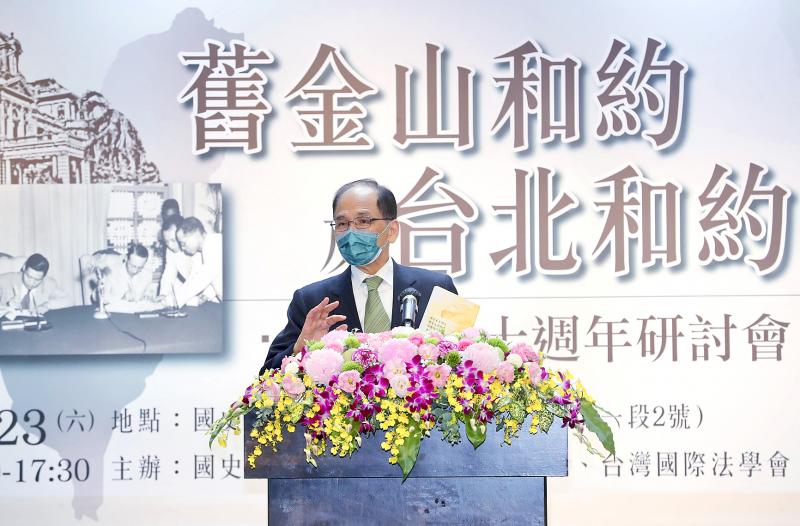A statement on the Ministry of Foreign Affair’s Web site asserting that the Cairo Declaration determined Taiwan’s status should be removed or updated, an academic said.
The Chinese-language statement, titled “Taiwan’s Status in International Law” (臺灣的國際法地位) and posted during former president Ma Ying-jeou’s (馬英九) administration, “caters to China’s sovereignty claims over Taiwan,” National Taiwan University law professor Chiang Huang-chih (姜皇池) wrote in an opinion piece published on Sunday in the Chinese-language Liberty Times (the Taipei Times’ sister paper).
The statement invokes the Cairo Declaration to argue that the Republic of China (ROC) has “exercised territorial sovereignty” over Taiwan in law and de facto since Oct. 25, 1945.

Photo: CNA
It contradicts remarks by Legislative Speaker You Si-kun (游錫堃), who late last month at a conference marking the “70th Anniversary of the Treaty of San Francisco and the Treaty of Taipei” said that under the Treaty of San Francisco, which came into force in 1952, Japan renounced its rights to Taiwan and Penghu, while leaving the areas’ legal status undetermined, to be resolved later under the principles of self-determination and the peaceful settlement of disputes.
The San Francisco and Taipei documents were signed in their respective cities on Sept. 8, 1951, by Japan and Allied forces, and on April 28, 1952, by Japan and the ROC to deal with territorial issues following World War II.
China’s Taiwan Affairs Office spokesman Ma Xiaoguang (馬曉光) has called the Treaty of San Francisco “illegal and invalid,” and the Chinese Nationalist Party (KMT) has called it “an invalid discourse that has long been refuted.”
“The KMT and the Chinese Communist Party both argue that Taiwan’s sovereignty was addressed in the Cairo Declaration, but the majority of Western academics believe it was resolved with the Treaty of San Francisco,” Chiang said. “The administration of President Tsai Ing-wen (蔡英文) should draft its own statement on the issue.”
The ministry said the statement remains on its Web site, because its policy is to keep all statements and documents from government administration available for public access, in accordance with the Freedom of Government Information Act (政府資訊公開法).
Chiang said that the government should remove or replace the statement, as it was “full of errors,” and incapable of establishing legal precedent.
If it must remain on the Web site, it should be amended to include other statements on Taiwan’s sovereignty, he added.
It could include statements such as former president Chen Shui-bian’s (陳水扁) calls for Taiwan’s participation in the WHO under the name “Taiwan,” Chen’s statement on there being “one China and one Taiwan,” and Tsai’s statements on the nation’s legal status made during an interview with the BBC, he said.
The ministry said that those statements are already available on the Presidential Office’s Web site, adding that the ministry published a UN statement issued following Taiwan’s application to join in 2007.
“The Cairo Declaration is not a treaty, has no legal effect and is not sufficient to result in the transfer of territorial sovereignty,” Chiang said. “Academics have frequently commented on the importance of updating public statements on issues, but the ministry has shown it has no interest in updating its Web site.”

South Korean K-pop girl group Blackpink are to make Kaohsiung the first stop on their Asia tour when they perform at Kaohsiung National Stadium on Oct. 18 and 19, the event organizer said yesterday. The upcoming performances will also make Blackpink the first girl group ever to perform twice at the stadium. It will be the group’s third visit to Taiwan to stage a concert. The last time Blackpink held a concert in the city was in March 2023. Their first concert in Taiwan was on March 3, 2019, at NTSU Arena (Linkou Arena). The group’s 2022-2023 “Born Pink” tour set a

CPBL players, cheerleaders and officials pose at a news conference in Taipei yesterday announcing the upcoming All-Star Game. This year’s CPBL All-Star Weekend is to be held at the Taipei Dome on July 19 and 20.

The Taiwan High Court yesterday upheld a lower court’s decision that ruled in favor of former president Tsai Ing-wen (蔡英文) regarding the legitimacy of her doctoral degree. The issue surrounding Tsai’s academic credentials was raised by former political talk show host Dennis Peng (彭文正) in a Facebook post in June 2019, when Tsai was seeking re-election. Peng has repeatedly accused Tsai of never completing her doctoral dissertation to get a doctoral degree in law from the London School of Economics and Political Science (LSE) in 1984. He subsequently filed a declaratory action charging that

The Hualien Branch of the High Court today sentenced the main suspect in the 2021 fatal derailment of the Taroko Express to 12 years and six months in jail in the second trial of the suspect for his role in Taiwan’s deadliest train crash. Lee Yi-hsiang (李義祥), the driver of a crane truck that fell onto the tracks and which the the Taiwan Railways Administration's (TRA) train crashed into in an accident that killed 49 people and injured 200, was sentenced to seven years and 10 months in the first trial by the Hualien District Court in 2022. Hoa Van Hao, a